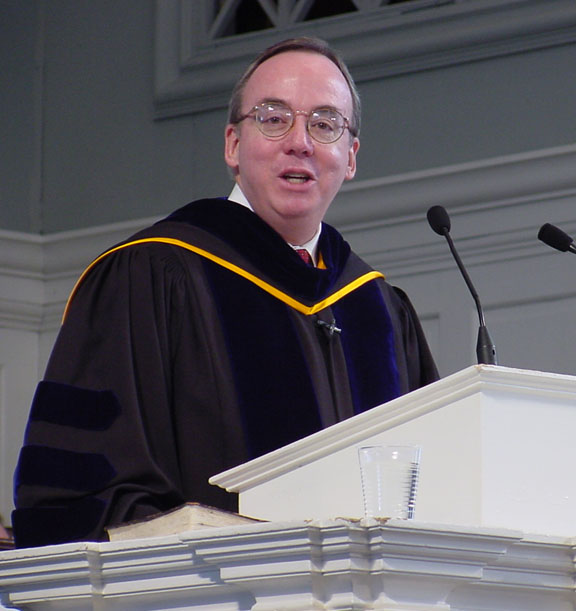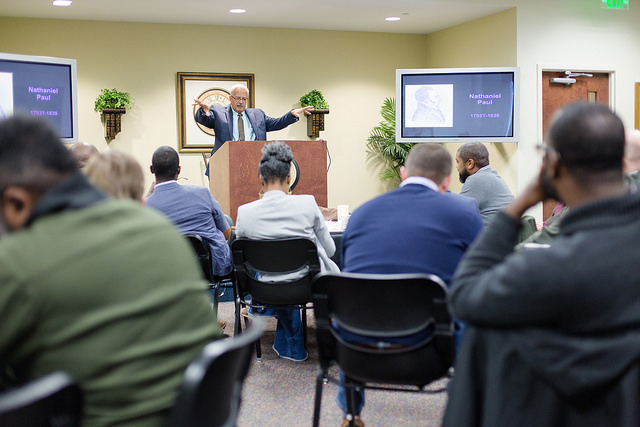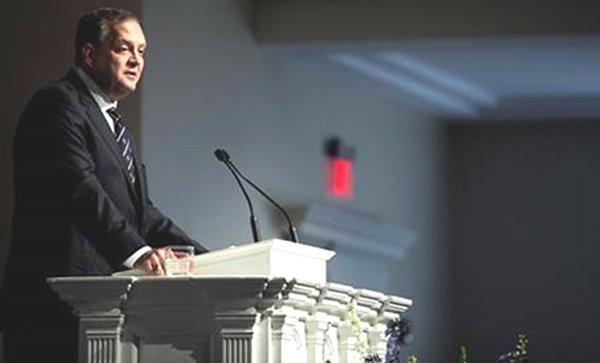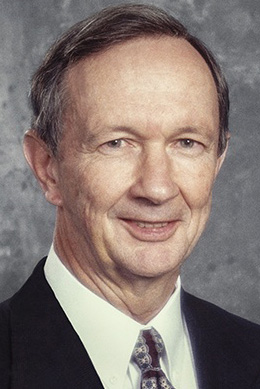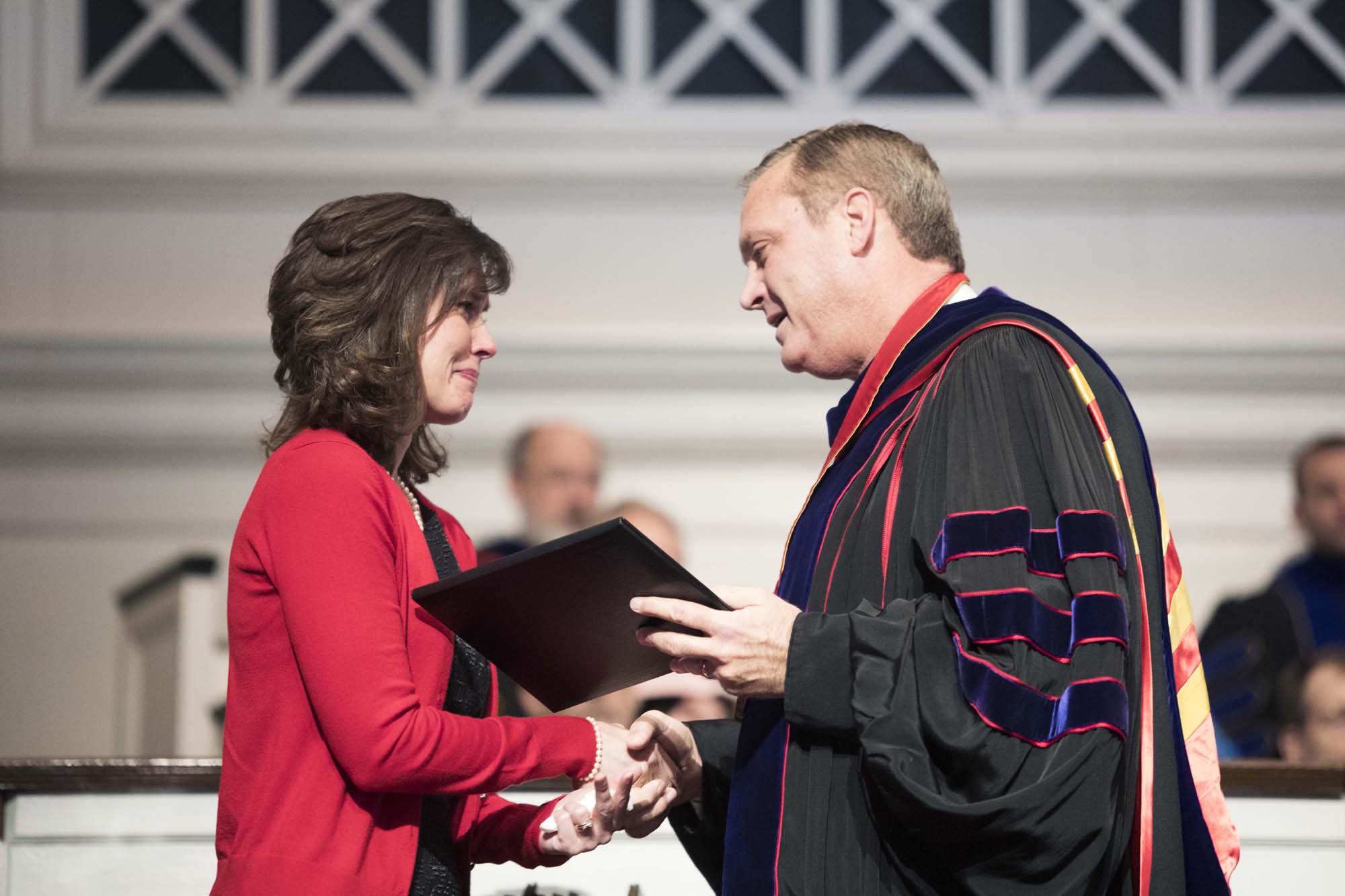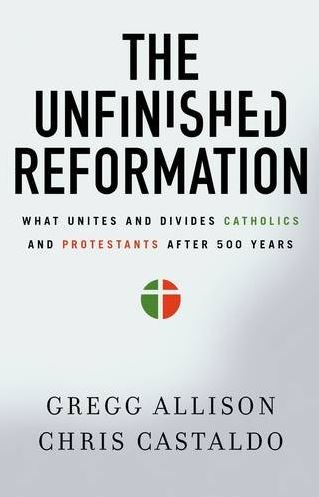
LOUISVILLE, Ky. (BP)–During the long struggle to gain control of the Southern Baptist Convention, both sides of the inerrancy controversy tried to claim Herschel Hobbs, the towering figure who had helped lead the denomination into the second half of the 20th century.
Hobbs, though, preferred not to be labeled, saying simply he was a “progressive conservative” and an “old-fashioned Southern Baptist.”
While admitting that Hobbs’ views are indeed difficult to label, Union University President David S. Dockery said Hobbs’ beliefs about Christ and Scripture can be embraced by all Southern Baptists. Dockery made his remarks March 22 during a Founders’ Day address at Southern Baptist Theological Seminary in Louisville, Ky. Each spring during Founders’ Day, the seminary community celebrates the life of a Southern Seminary pioneer.
Hobbs, a two-time graduate of Southern Seminary, is perhaps known best for his leadership in developing the 1963 Baptist Faith and Message statement of Southern Baptist beliefs. As SBC president, he helped pen the statement of faith that stood until the 2000 edition was approved overwhelmingly by messengers in Orlando, Fla.
Dockery said that although several controversies arose from the 1963 statement — particularly on issues surrounding the preamble and the article on the Scriptures — Hobbs’ view of the Bible was very clear.
“Throughout his life and ministry, Hobbs unapologetically affirmed the inspiration of the Bible,” Dockery said. “He was quite clear that the Bible is an inspired book. He unhesitatingly affirmed that the Bible is historically accurate and scientifically correct. ‘The Bible is not a textbook in science,’ he said, ‘but when it speaks in these realms it speaks truth.’
“Thus, Hobbs, like his mentor A.T. Robertson, maintained that the Bible is inerrant in its original autographs. He insightfully noted that to use the word infallible weakens the statement” because it can have two definitions: “without error” and “anything that does what it is supposed to do.”
Dockery said Hobbs believed “the stronger word for the Bible is inerrant.”
Hobbs also was explicit in his views on Christ, Dockery said.
“Hobbs’ theology was Christocentric in the best sense of that term,” Dockery said. “He believed that Jesus Christ is the key to humanity’s knowledge of God and history. Hobbs saw Christ throughout Holy Scripture. ‘The Old Testament,’ he said, ‘sounds the messianic hope. The Gospels record Christ’s incarnation. Acts relates his continuing work through the Holy Spirit. The Epistles interpret his person and work, and Revelation proclaims his final triumph and glory.'”
Dockery said “Hobbs was at his very best describing the work of Jesus Christ on behalf of sinners. … He explained that by the death of the Son of God and by nothing less could a just God become justifier of sinful men. … Hobbs believed that Christ’s death was sufficient and substitutionary, redeeming humans from the penalty of sin and reconciling them to God, doing for them what they could not do for themselves.”
Years after the 1963 BF&M was adopted, its language on the Scriptures was at the center of theological controversy. Much of the debate focused on one sentence — “The criterion by which the Bible is to be interpreted is Jesus Christ.” This sentence was used by some individuals as authorization to set the words of Jesus over against the words of Paul, other New Testament authors and much of the Old Testament. The sentence was removed in the 2000 edition and replaced with language identifying Christ as the focus of all divine revelation.
Dockery, though, said Hobbs’ intention in using the language was not to muddy the theological waters. Dockery said the additional phrase “reflects Hobbs’ belief that as an individual reads the Bible it is essential that he keeps in mind that Christ is central throughout. Many have criticized this phrase as opening the door to neo-orthodoxy in Baptist life, but Hobbs claimed that that was certainly not his intention.”
The 1963 Baptist Faith and Message was written in part as a response to charges of liberalism within the denomination. The only previous statement of belief came in 1925.
“It [the 1963 BFM] can easily be said that this was Hobbs’ finest hour,” Dockery said. “The resulting 1963 statement affirmed the convention’s biblical roots and built a consensus that helped advance Southern Baptist work for years, even decades.
“Yet a similar response failed to develop in the early years of the inerrancy controversy. Whether or not the history of the last two decades could have been different is impossible to say. Hobbs conjectured that they may have been.”
Dockery spoke on Hobbs’ beliefs on other topics, including his view on:
— The role of seminaries.
“He claimed that if these leaders [students] are to lead as Southern Baptists, they must be indoctrinated as to those things which Southern Baptists believe and practice,” Dockery said. “[The seminaries’] reason for being is to prepare future Southern Baptist leaders for a specific task.”
— Confessions.
“While Hobbs looked to an authoritative and inspired Bible as the source of his theology, and while he had great appreciation for our Baptist heritage, he nevertheless was hesitant to acknowledge the place of doctrinal confessions as normative for the Christian community,” Dockery said. “His emphasis on individualism and competency of the soul in each believer moved him to a false dichotomy between a living faith and a confessional faith.”
— Salvation.
Dockery said that Hobbs influenced the Southern Baptist move from a more Calvinistic view of salvation — which was embraced by J.P. Boyce and John A. Broadus, and to a lesser degree by E.Y. Mullins and W.T. Conner — toward a more modified Arminian understanding of salvation.
“He rejected the idea that God’s election is based on his choice of some,” Dockery said. “Instead, he maintained that God chose to limit his sovereignty so that men and women could either accept or reject God’s salvific offer in Christ.”
— Eternal security.
“Hobbs emphasized the perseverance passage in Scripture and generally ignored or reinterpreted the so-called warning passages,” Dockery said. “Hobbs’ emphasis on ‘once saved, always saved’ is perhaps one of his great legacies in Southern Baptist life.”
— The church.
“Hobbs understood that the church in the New Testament never refers to organized Christianity or to a group of churches,” Dockery said. “It denotes either a local body of baptized believers or includes all the redeemed through the ages. The emphasis among Baptists is on the local church. … Baptist churches, he claimed, are autonomous fellowships who exercise their independence through voluntary cooperation. It might not be too much to say that Hobbs had a more fully developed doctrine of the Southern Baptist Convention — its structure, organization, purpose and mission — than of the local or universal church.”
— The priesthood of all believers, soul competency.
Hobbs preferred the term “priesthood of the believer,” and included that language in the preamble to the 1963 Baptist Faith and Message.
“According to Hobbs, the priesthood of the believer entails both privileges — including direct access to God, confession of our sins directly to God and the right to read and interpret the Scriptures as led by the Spirit — and responsibilities, [such as the] responsibility to live a life of holiness, to witness, to love and to study our Bible,” Dockery said.
Hobbs, Dockery said, believed that the doctrine of the priesthood of the believer was related to the doctrine of salvation, the church and religious liberty.
Dockery said that Hobbs’ belief about soul competency was tied closely to his view on the priesthood of the believer.
“In each, the competency of the soul is given priority of attention,” Dockery said. “Timothy George has countered Hobbs’ understanding, contending that the priesthood of all believers is not to be equated with soul competency, religious liberty, modern individualism or theological minimalism. As a part of the doctrine of the church, George said it [priesthood of all believers] has more to do with Christian service than with the believers’ status.”
Dockery said “Hobbs seemingly missed the corporate nature of the priesthood in the New Testament, and thus de-emphasized the corporate aspect of the church and worship. The church, for Hobbs, was a fellowship of individual believers gathered together for service, evangelism and worship.”
— Southern Seminary.
“When I was being considered for the deanship [of the school of theology] here in 1991, he wrote me a letter and said, ‘Go and take care of Mother.’ In my last conversation with him in 1995, he said, ‘Be sure and take care of Mother.’ If I could see him today, I would be happy to say to Dr. Hobbs, ‘Through the outstanding leadership of Dr. Al Mohler, the administration and faculty at this place, ‘Mother’ is in very good hands,” Dockery said.
As Southern Baptists seek to build a consensus for a new century, they need to do so aware of some of “the weaknesses in Hobbs’ thinking,” Dockery said, citing particularly Hobbs’ views on justification, adoption, union with Christ, sanctification, his overemphasis on individual experience and his inadequate understanding of doctrinal confessions.”
But Dockery said that Hobbs’ strengths are many.
“The orthodox framework grounded in Jesus Christ and shaped by an inspired and all-sufficient Scripture is a lasting testimony to Hobbs’ great legacy, and Southern Baptists would do well to learn from it to build a new and needed convictional consensus rather than a programmatic one for our work together in the 21st century.
“As we begin the 21st century we do so with a huge debt of gratitude to a great leader and statesman who so faithfully served … a convention that he loved.”
Chapel messages can be heard through the seminary’s web site at https://www.sbts.edu/news/audio/speakers_chapel.html
–30–
(BP) photo posted in the BP Photo Library at https://www.bpnews.net. Photo title: DAVID DOCKERY and HERSCHEL HOBBS.
